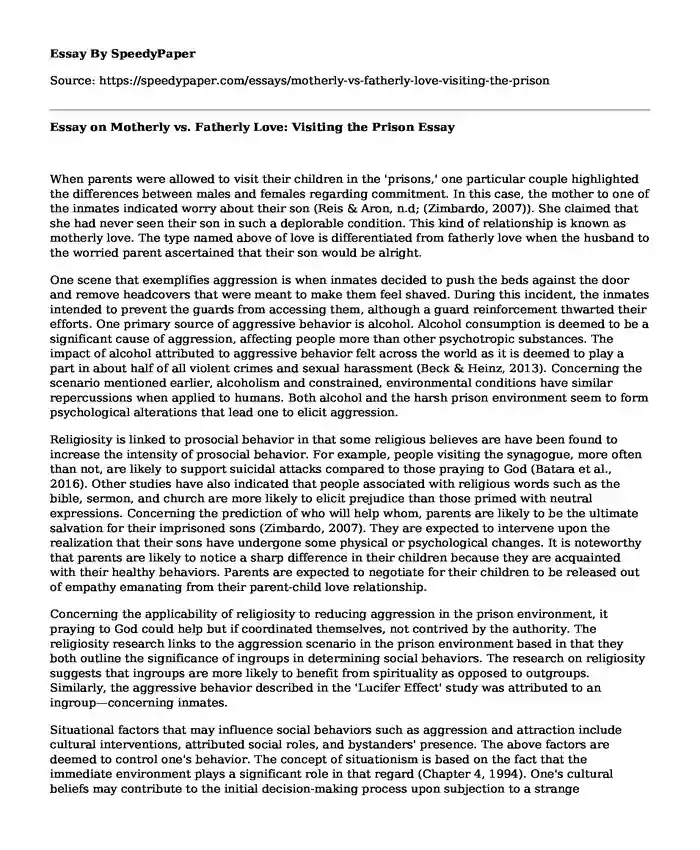
| Type of paper: | Essay |
| Categories: | Psychology Family Parenting Emotional intelligence |
| Pages: | 3 |
| Wordcount: | 776 words |
When parents were allowed to visit their children in the 'prisons,' one particular couple highlighted the differences between males and females regarding commitment. In this case, the mother to one of the inmates indicated worry about their son (Reis & Aron, n.d; (Zimbardo, 2007)). She claimed that she had never seen their son in such a deplorable condition. This kind of relationship is known as motherly love. The type named above of love is differentiated from fatherly love when the husband to the worried parent ascertained that their son would be alright.
One scene that exemplifies aggression is when inmates decided to push the beds against the door and remove headcovers that were meant to make them feel shaved. During this incident, the inmates intended to prevent the guards from accessing them, although a guard reinforcement thwarted their efforts. One primary source of aggressive behavior is alcohol. Alcohol consumption is deemed to be a significant cause of aggression, affecting people more than other psychotropic substances. The impact of alcohol attributed to aggressive behavior felt across the world as it is deemed to play a part in about half of all violent crimes and sexual harassment (Beck & Heinz, 2013). Concerning the scenario mentioned earlier, alcoholism and constrained, environmental conditions have similar repercussions when applied to humans. Both alcohol and the harsh prison environment seem to form psychological alterations that lead one to elicit aggression.
Religiosity is linked to prosocial behavior in that some religious believes are have been found to increase the intensity of prosocial behavior. For example, people visiting the synagogue, more often than not, are likely to support suicidal attacks compared to those praying to God (Batara et al., 2016). Other studies have also indicated that people associated with religious words such as the bible, sermon, and church are more likely to elicit prejudice than those primed with neutral expressions. Concerning the prediction of who will help whom, parents are likely to be the ultimate salvation for their imprisoned sons (Zimbardo, 2007). They are expected to intervene upon the realization that their sons have undergone some physical or psychological changes. It is noteworthy that parents are likely to notice a sharp difference in their children because they are acquainted with their healthy behaviors. Parents are expected to negotiate for their children to be released out of empathy emanating from their parent-child love relationship.
Concerning the applicability of religiosity to reducing aggression in the prison environment, it praying to God could help but if coordinated themselves, not contrived by the authority. The religiosity research links to the aggression scenario in the prison environment based in that they both outline the significance of ingroups in determining social behaviors. The research on religiosity suggests that ingroups are more likely to benefit from spirituality as opposed to outgroups. Similarly, the aggressive behavior described in the 'Lucifer Effect' study was attributed to an ingroup—concerning inmates.
Situational factors that may influence social behaviors such as aggression and attraction include cultural interventions, attributed social roles, and bystanders' presence. The above factors are deemed to control one's behavior. The concept of situationism is based on the fact that the immediate environment plays a significant role in that regard (Chapter 4, 1994). One's cultural beliefs may contribute to the initial decision-making process upon subjection to a strange environment such as prison. Those that are attributed to cultures formed around peace are likely to be non-violent.
In contrast, those that come from cultures that perpetuate violence are likely to participate in destructive activities. Social roles such as parenting may also make one more lenient when faced by a situation where their parenting is put to the test. For instance, a parent may think twice before harming a child compared to fellow peers. Bystanders affect one's decision-making in the sense that the aggressor may be aiming at pleasing them or irritating them.
References
Batara, J. B. L., Franco, P. S., Quiachon, M. A. M., & Sembrero, D. R. M. (2016). Effects of religious priming concepts on prosocial behavior towards ingroup and outgroup. Europe’s Journal of Psychology, 12(4), 635–644. https://doi.org/10.5964/ejop.v12i4.1170
Beck, A., & Heinz, A. (2013). Alcohol-Related Aggression. Deutsches Aerzteblatt Online. https://doi.org/10.3238/arztebl.2013.0711
Chapter 4: Which Situational Factors Influence Risk-Taking Behavior? (1994). The Psychology of Risk-Taking Behavior Advances in Psychology, 113–128. https://doi.org/10.1016/s0166-4115(08)61298-4
Reis, H.T & Aron, A. (n.d). Love: What is it, Why does it matter, and how does it operate? Department of Clinical and Social Sciences in Psychology, University of Rochester, and the 2 State University of New York at Stony Brook.
Zimbardo, P. (2007). The Lucifer Effect: Understanding how good people turn evil. https://www.lucifereffect.com/
Cite this page
Essay on Motherly vs. Fatherly Love: Visiting the Prison. (2023, Oct 27). Retrieved from https://speedypaper.com/essays/motherly-vs-fatherly-love-visiting-the-prison
Request Removal
If you are the original author of this essay and no longer wish to have it published on the SpeedyPaper website, please click below to request its removal:
- Essay Sample on Dred Scott Decision
- Essay Example: Trump and Hillary Debate
- Free Essay on the Issue of Undocumented Students
- Gender Roles in Moll Flanders by Daniel Defoe
- Access Health Care and Social Services. Essay Sample
- Marketers Embrace Technology Consumers: Thriving on Chaos - Essay Sample
- Color Consciousness in America: Unveiling Complexities, Media Portrayals, and Solutions - Paper Example
Popular categories




